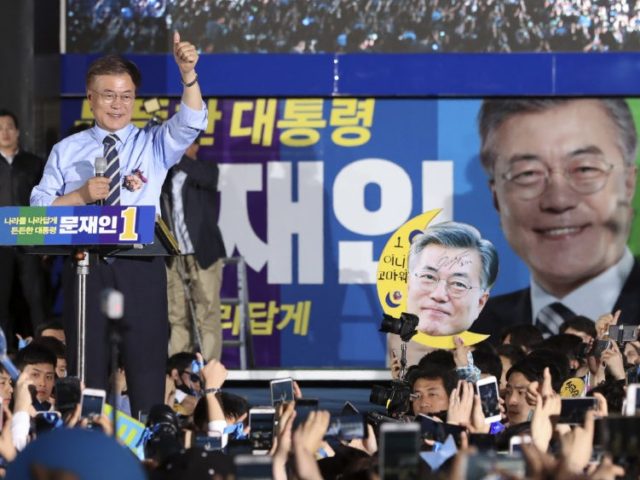North Korea’s Kim Jong-un, assessing South Korean opposition to his aggressive nuclear and missile programs, must believe his predecessors — father Kim Jong-il and grandfather Kim Il-sung — are out there working in the netherworld to do what they can to influence acceptance by the world community of Pyongyang as a nuclear-armed power.
The appeasement approach by South Korea’s new president, Moon Jae-in, plays right into such a Kim mindset.
President Moon was ushered into power due to a May 9th election made necessary by a presidential first in the country’s history. Park Geun-hye, his predecessor and a member of the conservative Grand National Party, was impeached for political corruption. Moon, a member of the liberal New Politics Alliance for Democracy Party, heartily won the election to replace her.
Moon declared victory with the statement, “Today is the day to open a door for a new Republic of Korea.” Undoubtedly, there was euphoria just across the DMZ as Kim knew that, as far as his nuclear program was concerned, for the Democratic People’s Republic of Korea it would be business as usual.
One would not necessarily peg Moon as embracing a liberalist ideology — after all, he was not only a former special forces’ soldier but his parents were refugees who escaped North Korea. But while President Park’s administration understood the reality of the nuclear threat lying just to the north, President Moon’s administration clearly does not. Perhaps his later activities as a human rights lawyer numbed him to this reality.
Moon made it clear during his campaign that, despite Pyongyang’s increasingly aggressive behavior, he was open to talks with Kim. Moon had served as chief of staff for South Korea’s last liberal president, Roh Moo-hyun (2003-2008), who had continued what was dubbed the “Sunshine Policy,” established by his predecessor Kim Dae-jung (1998-2003).
The Sunshine Policy was built upon the belief that warmly engaging Pyongyang “through economic development, tourism, and cultural exchange would lead to a more open North Korea.” The policy was basically one of appeasement. While it did lead to two summit meetings in Pyongyang in 2000 and 2007, little attention focused on the fact the South had to pay hundreds of millions of dollars to get the North to agree. Pyongyang’s motivation to negotiate has always been financial rather than any true desire for peace.
Unfortunately, ten years of Seoul’s Sunshine Policy brought nothing but storm clouds to the Korean peninsula. Despite this dark history, President Moon naively seeks to jump-start the policy again.
The new president made known prior to his meeting with President Donald Trump in July, through a spokesman, that he felt love, not war, was the way to resolve issues with the North.
Moon’s special advisor Moon Chung-in suggested as much in June. He called for U.S. nuclear aircraft carriers to steer clear of the Korean peninsula and downplayed the importance of the Terminal High-Altitude Area Defense (THAAD) battery, to shoot down missiles from the North, being stationed there at the time. He added, “Tension on the peninsula could be eased if those U.S. strategic assets are scaled down to the level they were before 2010.”
The special advisor did not stop there, even bringing the U.S.-South Korea alliance into question over the THAAD issue with his statement, “There’s talk that our alliance will break up if THAAD-related issues are not resolved. I wonder if such relations could really be considered an alliance.”
Furthermore, he ludicrously suggested America may have provoked Pyongyang into its recent frenzy of missile tests by deploying U.S. carriers and bombers to the Korean peninsula.
While advisor Moon said these were his personal opinions, he also said it “would not be wrong” to say President Moon agrees with him.
President Moon later announced $8 million in humanitarian aid would be sent north to feed over 200,000 starving children in the North.
All of this only serves to undermine Moon’s mid-September assertion, “my country will never accept a nuclear North Korea.”
Clearly, the Moon government is paving the road again to resurrect the Sunshine Policy of old. Pyongyang undoubtedly sees the timing of the fall of a hard-nosed Park administration in South Korea and its replacement with a “kinder, gentler” Moon Administration to be a gift, allowing him to achieve his ultimate goal of a nuclear arsenal.
Secretary of State Rex Tillerson now reportedly claims to have direct channels to the North Koreans. His efforts during those negotiations to get Pyongyang to abandon its nuclear program will be difficult, if not impossible. Unfortunately, the level of difficulty he will have in doing so has astronomically increased as the North Koreans know their brothers to the South and the Americans are not marching to the beat of the same drummer. Meanwhile, while not denying Tillerson the opportunity to negotiate, Trump has indicated he feels any such effort, based on Pyongyang’s long track record of failing to meet its commitments, is futile.
Moon’s naivete that appeasement will work against a diabolical Kim mindset leaves him blind to the fact he is dancing to the tune of Pyongyang’s puppet master.
Lt. Colonel James G. Zumwalt, USMC (Ret.), is a retired Marine infantry officer who served in the Vietnam war, the U.S. invasion of Panama and the first Gulf war. He is the author of “Bare Feet, Iron Will–Stories from the Other Side of Vietnam’s Battlefields,” “Living the Juche Lie: North Korea’s Kim Dynasty” and “Doomsday: Iran–The Clock is Ticking.” He frequently writes on foreign policy and defense issues.

COMMENTS
Please let us know if you're having issues with commenting.